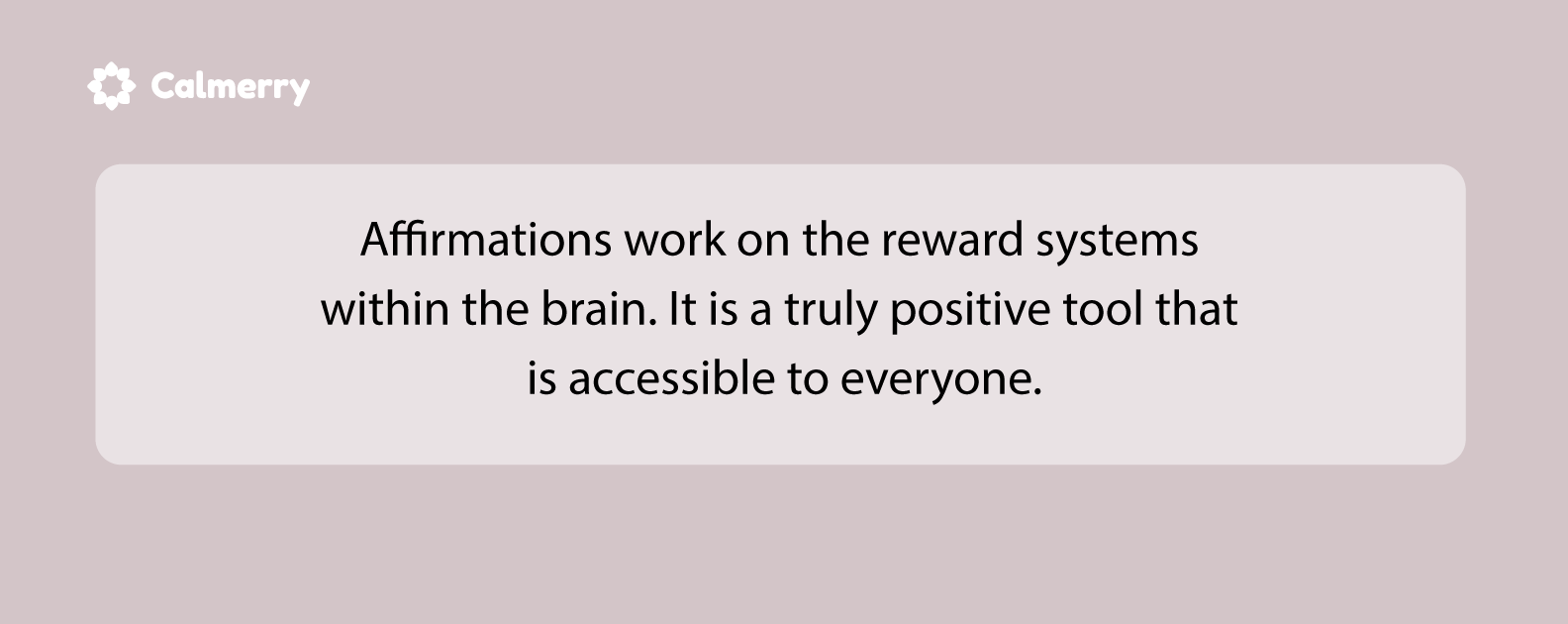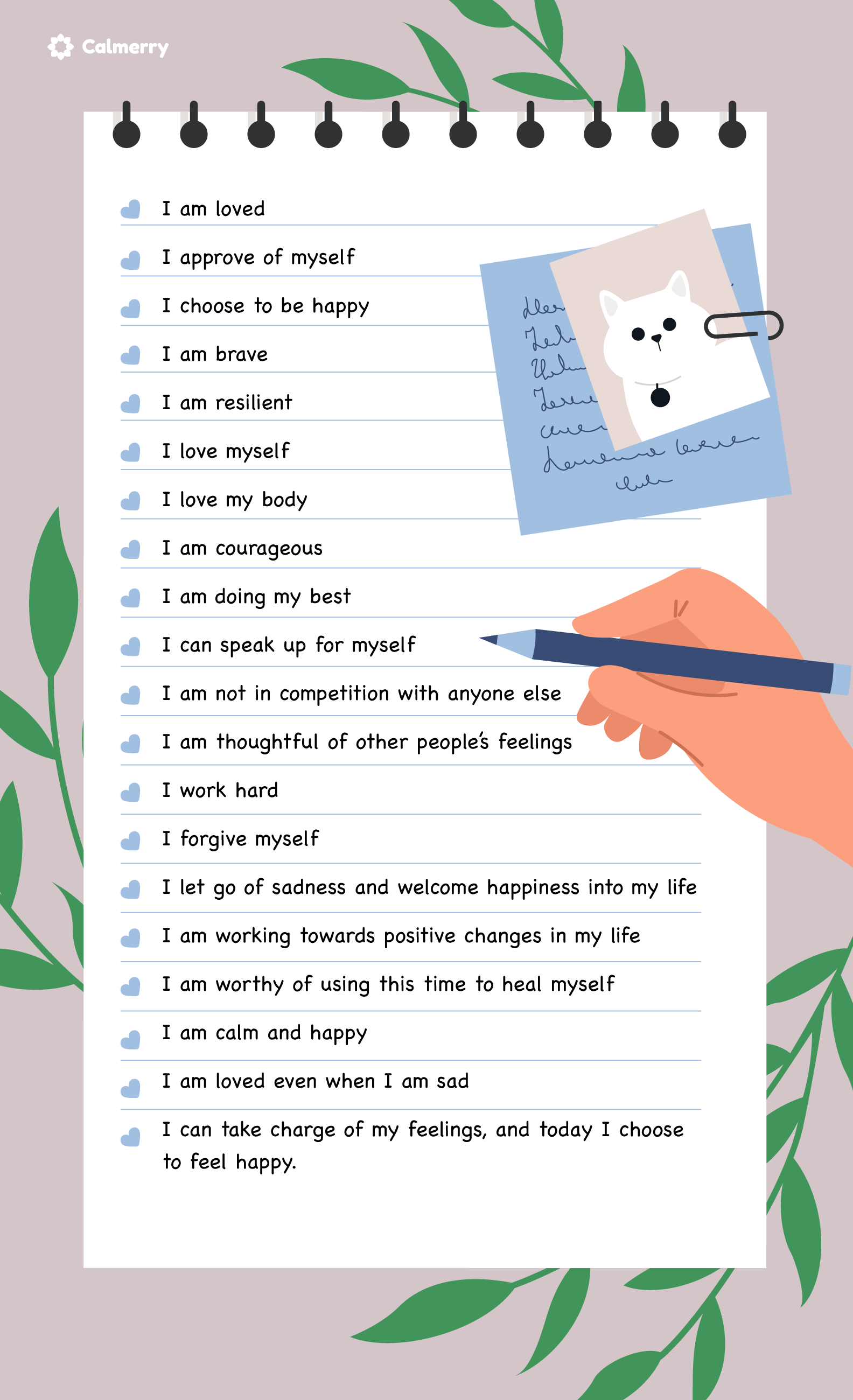How to Write Positive Affirmations for Depression

In this article
The World Health Organization defines depression as a “persistent sadness and lack of interest or pleasure in previously rewarding or enjoyable activities.” It can also lead to disturbed sleep and appetite, as well as poor concentration and tiredness. Over 280 million people are affected worldwide.
Psychological therapies, such as online counseling and pharmacological treatments, can be beneficial in helping to ease the symptoms of depression. But in this article, we will look at the scientifically proven benefits of writing and practicing daily affirmations for depression.
The brain and depression
If you are experiencing depression, you may be familiar with the feelings of sadness, low mood, and even hopelessness. When the things that you used to enjoy no longer interest you, or you notice feelings of worthlessness, it can feel like you’ve become caught in a downward spiral.

Physical brain changes
Even though depression is classified as a mental health condition, scientists have noted that specific physical changes occur in the brains of those affected by it.
Depression that lasts for several months, or recurs several times, can lead to shrinkage of areas of the brain, including the hippocampus and the amygdala. This loss of volume can be associated with a reduction in certain aspects of cognitive functioning, too, although overall intellectual performance remains unaffected.
Chronic depression can also result in brain inflammation. A study of those who had lived with depression for over 10 years, with little antidepressant treatment, showed over 30% more brain inflammation when compared to control patients without depression. Inflammation of the brain cells can lead to difficulties with brain development, memory, and learning.
Fortunately, appropriate antidepressant treatment, seeing a therapist, and using techniques taught through CBT can all help to manage depression and its physical effects on the brain. There is also some evidence that writing and repeating affirmations can help with the symptoms of depression.
Neuroplastic brain changes
In depression, the brain can become re-wired into negative thought patterns, leading to a negative spiral of emotions. This re-wiring, known as neuroplasticity, involves the brain re-organizing itself to adjust to both internal and external changes.
Research studies have shown that in depression and other mental health disorders, maladaptive neuroplasticity may occur, resulting in the brain becoming re-wired in a way that promotes the persistence of negative thoughts.
Learning that depression can cause physical and re-wiring changes in the brain can be alarming. But luckily, even when the neuroplasticity is maladaptive, the brain is malleable enough to rewire itself in a positive way once more.
Scientists have now demonstrated that there are ways to promote positive neuroplasticity in a way that has shown promise in treating depression.
In medical terms, positive re-wiring of the brain can be encouraged by:
- Antidepressant treatment
- Other pharmacological medications
- Deep brain stimulation
However, scientists have also proven that healthy neuroplasticity can be reinforced at home in the following ways:
- Taking more exercise
- Making music
- Playing video games
- Working on positive self-affirmations
Can affirmations help with depression?
In short, positive self-affirmations can help if you are experiencing depression.

Affirmations work on the reward systems within the brain. In a study, participants who used affirmations were able to protect themselves from negative thoughts as their brains became more active in the areas that allow us to recognize our own self-worth and value. In those who did not use affirmations, this emotional protection did not occur.
Aside from their efficacy, affirmations should be seen as a truly positive tool that is accessible to everyone. One of the perks of using affirmations is that they can be written at home at a time to suit you, and they won’t cost you any money.
What are affirmations?
Affirmations are positive phrases or statements that you write about yourself. At first, it can feel a little awkward to put pen to paper and praise your own virtues, especially when you are feeling low. However, once you get past any initial discomfort, affirmations can help you to challenge unhelpful or negative thoughts.
Your first affirmation could be, “I am strong.” Due to depression, you may previously have perceived yourself to be weak. However, you have had the strength to persevere, even when faced with low mood or despondency for life. Repeating “I am strong” every day will help you to remember what you have faced and what you continue to achieve and overcome every day.
There is scientific evidence that repeating affirmations helps to reduce negative thoughts when faced with stressful or upsetting situations, too. If you write and then repeat your affirmations regularly, you switch to periods of positive thinking. You may start to feel more confident as the process of neuroplasticity starts to occur.
How to write affirmations
If you feel daunted about writing affirmations initially, you are not alone. Writing with confidence about yourself when you are feeling sad or low can be a big hurdle to overcome.
In our guide, you may recognize affirmations that are true to you, giving you the motivation to start writing some affirmations that will boost your self-esteem.
Some people find it helpful to monitor their feelings over a week, making a note of any negative thoughts that occur and any patterns that are present. If you notice that you experience loneliness but, in reality, do have friends or family supporting you, an affirmation such as “I am loved” may be appropriate.
Remember that your affirmations may change depending on how you are feeling. And you may find that you need to re-write them regularly. Affirmations could soon become one of your coping methods.
Our list of positive affirmations for depression
If you have never written an affirmation before, it can be difficult to know where to begin. Our list of affirmations for overcoming depression is a great starting point.
Read each affirmation slowly to see if any ring true for you. And if so, you can choose to take that affirmation on as your own.

Writing powerful affirmations
When writing affirmations, it is most helpful to begin with “I am…”. Although it can be tempting to write “I will be happy” rather than “I am happy,” the first affirmation is not as powerful.
Stating “I am” helps to reinforce the fact that you are determined with your affirmations. Strong statements prompt your brain to make the necessary changes, including neuroplastic rewiring, required to improve your outlook and mood.
“I am” will make it easier to believe your affirmations, helping you to reap more benefits.
Repeating your affirmations several times each day can be seen as a form of self-care. Great times to go over your affirmations include when you wake up, when brushing your teeth or showering, driving to work, exercising, during meditation, and before you settle to sleep.
You could even create a graphic for your phone so that each time you look at it, you can see your affirmations. Alternatively, write your affirmations on a piece of paper and stick it up at home for regular positive reinforcement of your beliefs.
Read your affirmations out loud, and do so with confidence so that you start to believe what you’re saying truly.
Going through your affirmations and absorbing their meaning will begin to minimize negative thoughts, reminding you of your self-worth and boosting your self-esteem.
Final thoughts
Affirmations cause neuroplastic changes to occur within the brain. These changes can lead to protection against negative thoughts and increased activity in the areas of the brain responsible for self-processing and self-valuation.
Writing affirmations is a process, and your statements are likely to change over time. If you are struggling to write affirmations, an online therapist can help you make sense of your thoughts so that you can write affirmations that are not only true to you but could also support your recovery from depression. Moreover, engaging in depression counseling can provide you with the structured guidance and feedback you need, helping you navigate the complexities of your emotions and challenges. Such counseling can be especially beneficial in reinforcing the positive effects of affirmations, fostering resilience, and encouraging holistic healing.
online therapy
live video session


